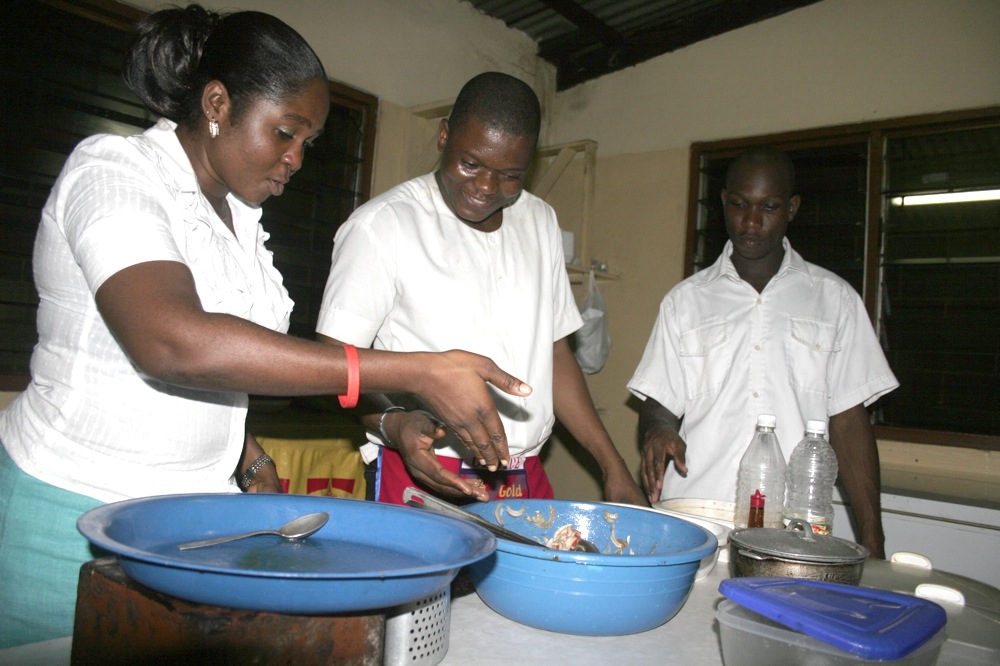
As expats arrive to develop the new oil industry, local restaurants are thinking bigger
Bubbling hot oil spills over the side of a pan as chopped plantains are dropped in, while a large drum of chicken cooks in spiced sauce, next to a pot of simmering goat light soup. Smoke from the brick-grilled tilapia seeps in from outside, creating an infused aroma of the culinary essence of Ghana.
The busy kitchen of Maquis Tante Marie in the Ghanaian capital of Accra specializes in West African cuisine: Ghanaian staples like fufu — mashed cassava balls — and tomato paste jollof rice.
Restaurant owner Yvone Laryea, originally from the Ivory Coast, opened Tante Marie in 2000, to help make up for the lack of established West African restaurants in Accra. She hopes to attract not only Ghanaians, and francophones from neighboring countries, but also tourists, and expats drawn here by the promising prospects of the new oil industry.
Hospitality is one of Ghana’s fastest-growing industries, on the heels of the 2007 discovery of oil off the coast, and international interest being channeled into the new oil reserve. To date the upscale restaurant market has been dominated by foreign, especially French and Chinese, cuisine. Now, many in the food industry are trying to promote Ghanaian cuisine, sometimes by challenging the traditional ways of food preparation, to try to make it more appealing to foreigners.
“For years people have felt everything foreign, especially European and American, is better,” said George Ansere, principal quality assurance officer of the Ghana Tourist Board. “But the trend is changing; we are realizing that our food isn’t [as] backwards as we might think.”
But restaurant owners complain bitterly that job applicants, even graduates of hospitality programs, are often insufficiently prepared for the work.
“Culinary training in this county needs to be more serious,” said Jean Awad, 45, owner of French restaurant Le Magellan. “Graduates have this printed paper saying they passed, but they come here, and we have to teach them again.”
South Africa and Kenya, with their large international populations, are considered African culinary leaders in Africa. But new influx of foreigners into Ghana has introduced suggestions that this country improve the quality of its restaurant food.
“The understanding of the local cuisine is very high, but exposure to what makes for five-star standard cuisine is still a bit limited,” said Sanjay Narain, 42, the CEO of catering company Allterrain Services Group. “It’s possible to work to high international standards — it just takes training, education, and discipline.”
Cooks and caterers must first be better trained, industry professionals say.
“There’s a gap between what the industries are expecting and what the academic institutions are producing,” said Ansere.
For Charles Agbenuzah, 45, head chef of the five-star African Regent Hotel restaurant, the problem is what training schools teach.
“Things they learn from books and classrooms aren’t applicable to the practical field,” he said. “You see the vast difference when trainees come into the industry; they don’t know what actually pertains to the field.”
Often, they lack information about personal, kitchen and food hygiene.
“That’s insidious to the industry,” said Agbenuzah, “if the trainees don’t know the reason why they have to be hygienic.”
Some professionals are calling for the creation of a new culinary training institution. Believing a proper training institute could put Ghana on the map, Nutepe Kartey-Attipoe, general secretary of the Ghana Chef Association, has been reaching out for aid from NGOs and investors.
Others suggest improving existing institutes, or working to create a more unified sector.
“There a lot of separation in the industry, with no governing body,” said Efua Goode-Arthur, director of the EKGS Culinary Institute. “People are doing things anyway they like. If we come together as a group to share ideas and have a structure, that’ll really help.”
Approximately 250 students graduate from EKGS each year, and Goode-Arthur said that help create jobs. But some believe internships are not producing trainees with the desired skill levels so other techniques must be explored.
Currently, the domestic market is dominated by informal “chop bars,” local eateries that are usually unlicensed and unhygienic. The tourist board has made efforts to bring many of them into the formal economy, by adding a third category to the restaurant grading system, and changing the language use to describe them.
Ghana’s 1,549 licensed “traditional catering establishments” far outnumber the 363 formal restaurants and fast food eateries.
Chop bars hold special importance for Tante Marie’s Laryea, who learned about restaurants by watching her mother run one. She argues that chop bars are a must-have cultural experience for visitors.
“It’s the typical image of Africa. Anybody can walk in and have the local dish, eat with their hands, and chat like they’re at home,” said Laryea. “It’s interesting for foreigners to feel the atmosphere, so we must work on getting them hygienic.”
Still, she envisions a future that includes global African restaurant franchises.
“You have McDonald’s world-wide; an African restaurant should be able to export itself all over the world too,” she said” “But we need to have that high standard training ground to carry out this dream.”
Grace West was a student in the New York University journalism institute’s 2011 Reporting Africa program.
What's your view?
You must be logged in to post a comment.




